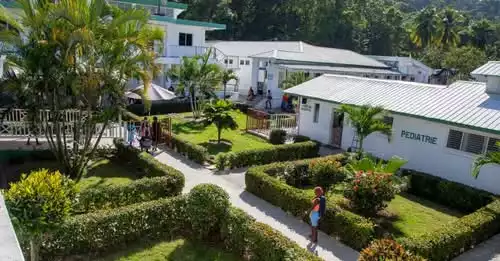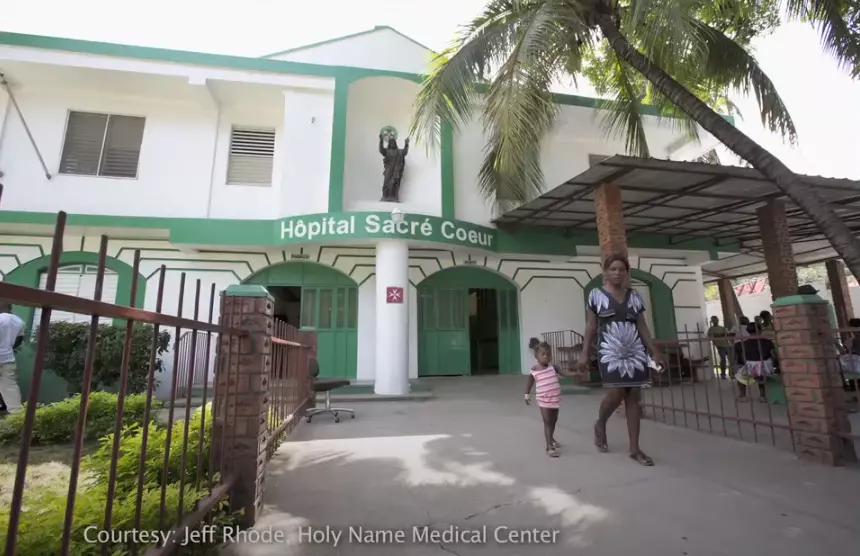Neo-Natal Equipment
for Maternity Ward
at Hôpital Sacré Coeur, Millot, Haiti
Our latest and most ambitious undertaking is to equip a neo-natal maternity ward at the Hôpital Sacré Cœur in Millot, Haiti,
in cooperation with Holy Name Hospital in Teaneck.
Fundraising Goal
Fundraising Goal
Funds Raised To Date
Percent of Goal Reached

We are currently in the planning phase defining the scope of the project as well as the financial resources required. We will then move to the fundraising phase in cooperation with Holy Name and other international Rotary clubs. During the build phase we will have opportunities to see our efforts turn into a modern maternity facility through onsite visits.
PROJECT DESCRIPTION
Our project aims to deliver lifesaving hospital care at Hôpital Sacré Coeur in Milot, Haiti for premature infants born before 32 weeks or weighing less than 1,500 grams, ensuring they survive and thrive. These vulnerable newborns require highly specialized equipment that replicates the protective environment of the womb, including precise control of lighting, temperature, humidity, and sound. The survival rates will dramatically increase by creating optimal conditions for growth and development.
Secondly, we aim to raise the funds to purchase equipment to support highly premature infants during this critical stage. This project primarily benefits the infants and their families, offering them hope and a healthier future.
Thirdly, the project aims to improve the capacity of the local hospital to provide healthcare and to enhance health infrastructure of the local community.
Join the People of Action
If you want to make a difference in the lives of people and secure life-saving neonatal medical care for newborns in Milot, Haiti,
please click on the link below to donate.
Frequently Asked Questions
The following section provides answers to frequently asked questions about this project. If you have additional questions, please Contact Us
Brief description of the project?
Our project aims to deliver lifesaving hospital care at Hôpital Sacré Coeur in Milot, Haiti for premature infants born before 32 weeks or weighing less than 1,500 grams, ensuring they survive and thrive. These vulnerable newborns require highly specialized equipment that replicates the protective environment of the womb, including precise control of lighting, temperature, humidity, and sound. The survival rates will dramatically increase by creating optimal conditions for growth and development. Secondly, we aim to raise the funds to purchase equipment to support highly premature infants during this critical stage. This project primarily benefits the infants and their families, offering them hope and a healthier future. Thirdly, the project aims to improve local healthcare providers' capacity and enhance the local communities' health infrastructure.
What are the goals of the project
We aim to reduce the neonatal and newborn mortality rate in this part of Haiti while providing medical treatment to 50-99 children under age 5 per month.
What is the Hôpital Sacré Coeur?
Hôpital Sacré Coeur is a 230-bed tertiary care hospital in the northern Haiti town of Milot. This medical and economic development mission was established1968 and has enjoyed uninterrupted service. The immediate region services 2.5 million people. The larger region in the north is home to 3.4 million people. The hospital has performed over 5 million patient transactions in the last ten years.
What is the role of Holy Name Hospital in this project?
In 2012, the Holy Name Foundation of Teaneck, NJ, brought The CRUDEM Foundation, Inc. under the medical network of Holy Name as Haiti Health Promise of Holy Name. The CRUDEM Foundation assumed financial and technical support for Hôpital Sacré Coeur in 1995. Besides substantial financial support, Holy Name provides the full range of technical, operational, training, and administrative assistance to Hôpital Sacré Coeur. It augments them with a network of U.S. medical professionals, volunteers, and resources. Appropriate medical, financial, and administrative staff continually audit the operations and finances of Hôpital Sacré Coeur.
What are the roles of Holy Name Hospital, Rotary Club of Te Palisades and Milot Rotary CLub?
Holy Name, a prominent medical network in Teaneck, New Jersey, has a longstanding commitment to Hôpital Sacré Cœur in Milot, Haiti, and fosters a strong partnership rooted in community connection and support. Rotarian Rick Pumo, a past president of the Rotary Club of The Palisades and member of the Holy Name’s Facilities Committee for the Board of Trustees, has brought this grant to fruition. The initiative will be carried out at Hôpital Sacré Cœur, leveraging its deep ties to the local community. Through the hospital, we have engaged the Rotary Club of Milot, which has committed to collaborating on the project, particularly in fulfilling on-the-ground reporting and monitoring requirements essential to the grant's success.
What are the community needs this projects addresses?
A typical village in Haiti often lacks reliable infrastructure, with many homes constructed from simple materials such as wood, tin, or cinder blocks, offering limited protection against the elements. Access to clean
water and sanitation is scarce; if available, electricity is often intermittent. Economic opportunities are limited, leading to reliance on subsistence farming, small-scale trade, or external aid, while community life
remains vibrant and closely knit. There is limited and unreliable state-provided health care. Haiti has only one physician for 10,000 people. Haiti has only an estimated 300 pediatricians --- serving the needs of over 4.8
million children aged 14 or less. There are only three pediatric residency programs with 27 positions. The number of skilled OBGYN physicians is equally bleak and points to a grossly underserved medical area. The
fact that the number of physicians to people can only be estimated is telling in and of itself.
In Haiti, infants are dying at a rate 10 times higher than in the U.S. This is due, in part, to the fact that 42% of Haitian mothers give birth without a skilled attendant, often on dirt floors. Outcomes are infinitely better at a
facility like Hôpital Sacré Coeur. Even so, resources are stretched thin, and more can be done, particularly for infants born before 32 weeks. The infant mortality rate for neonatal babies in Haiti is 38 deaths per 1000 live
births, a rate significantly higher than in other countries. Many deaths among neonates can be prevented when high-impact interventions target key causes such as access to qualified and available healthcare. This project
aims to support the UN Sustainable Development Goal (SDG) to reduce the neonatal mortality rate to 12/1000 live births by increasing the number of life-saving NICU isolettes and thus increasing the number of
neonates with access to this specialized and critical equipment.
How did we identify the need for this project?
Rick Pumo, Past President of the Rotary Club of The Palisades and a member of the Facilities Committee for the Board of Trustees at Holy Name in Teaneck, NJ, has been actively involved in fostering collaboration between the two organizations. Holy Name's longstanding commitment to Hôpital Sacré Cœur in Haiti identified a critical need for neonatal equipment to support its operations. The Rotary Club of The Palisades suggested securing an international grant, prompting the hospital to conduct a comprehensive needs assessment to evaluate and prioritize the required resources.
How were members of the benefiting community involved in finding solutions?
Hôpital Sacré Cœur plays a vital role in the local community by employing and training a wide range of personnel, including doctors, nurses, medical staff, maintenance workers, security personnel, and groundskeepers. The hospital is the main economic engine for the Milot and more significant northern regions. The hospital works closely with the community, which understands its most pressing needs and helps prioritize necessary resources. The hospital itself determined the specific equipment required to support this mission effectively. Biweekly video conference calls between Holy Name medical, administrative, and facilities staff and their Hôpital Sacré Cœur counterparts illume areas of critical concern. Working collaboratively, both staff members ascribe the best next steps for resolving the issue. In this case, the lack of critical neonatal resources limits the ability to address the increasing demands from the community patient populations in this area. In this case, the plan required increased NICU isolettes and training hospital staff in their use.

